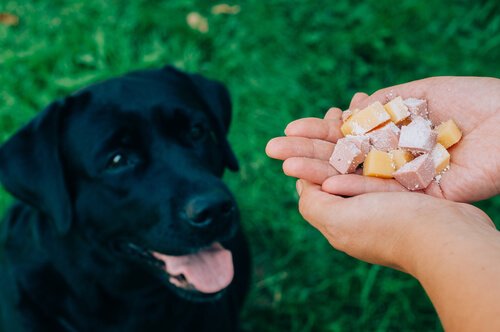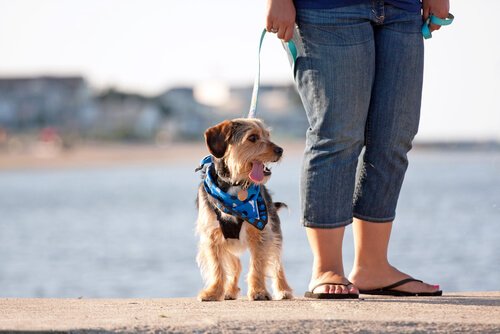Things that Produce Gas in Dogs


Written and verified by the lawyer Francisco María García
Gas in dogs can be minor, but it can also be a sign of a serious problem. Its symptoms are similar to those in humans: intestinal discomfort and unpleasant smells.
In the most serious cases, a dog can die due to a stomach torsion derived from gas. Normally the accumulation of gas in the stomach and intestine of the dog can cause him discomfort. Experts claim that normally the animal will expel air through the mouth and anus. In the most serious cases, the abdomen will be very hard and he will suffer from cramps and stomach torsion.
Causes of gas in dogs

In most cases, the origin of gas in dogs is related with diet, some diseases, and the lifestyle they have.
Certain foods are associated with slow and heavy digestion, and this causes the food to remain longer than it should in the intestine. In turn, this causes gas in the dog. Among these foods, vegetables stand out. Also carbohydrates and fiber can cause flatulence in dogs.
As with people, there are dogs that have a tendency to eat too quickly. They swallow a lot of air, which causes the accumulation of gas in the stomach. This problem usually happens more frequently with puppies and pug-nosed dogs. For example, bulldogs don’t bite very well, don’t chew the food a lot, and tend to accumulate gas.
Gas in dogs from diseases
Cardiac or pulmonary diseases are factors that have a high risk of flatulence.
Besides that, the dog’s lifestyle, especially if it’s an older dog, could be a factor for the risk of gas. Therefore, physical activity is recommended for the dog, but never before or after eating.
How to prevent gas in dogs
Flatulence in dogs can be prevented. There are many nutritional factors that will help. Dogs with food intolerances can suffer from gas more often. Therefore, it is even more important to give the best-quality dog food to these animals, which will facilitate digestion.
Dog food labeled “high-end” has a proven quality and it’s characterized by easy digestibility. In the case of dogs that ingest food too quickly, like puppies, it is a good idea to use adaptable bowls with restricted access. That way, the dog won’t be able to take too much food during a single meal.
In regard to pug-nosed or brachycephalic dogs, there is special food on the market. Normally these are rolls with a specific size and shape, to force the dog to chew longer and thus prevent him from swallowing air.
If our pet suffers from some type of intestinal parasite, respiratory illness, liver problem, that is, diseases that imply gas formation, it will be necessary to find specific treatments to stop flatulence problems.
Consequences of flatulence
Signs or symptoms that our friend suffers from flatulence vary according to the seriousness of each case. Besides the expulsion of gas through the mouth and anus, a dog can experience weight loss, vomiting, or diarrhea.
With the most serious illness, the dog can suffer from cramps, abdominal pain and hardness, along with a dilation of the stomach (tympanism) that could cause death.
Usually a dog with gas will be apathetic, miserable, and not hungry. When faced with this discomfort, he will lean on the floor to seek relief in two ways: he will bring his abdomen closer to the floor to feel cold. Dogs with flatulence also tend to lie down in an interesting position, called Mohammedan, which consists of resting the front legs on the floor and keeping the back legs raised.

Some guidelines
- We must not feed our dog products that are difficult to digest. Some examples are broccoli, peas, beans, lactose products such as milk and cheese, etc.
- As we have seen, it is important that the dog food we use has the best quality. High-quality food costs more, but it’s made with a larger amount of digestible ingredients.
- Be careful with leftovers. Some food that we eat are beneficial to dogs; however, processed products and sugary snacks can hurt our dog’s stomach and cause gas.
- If the food that we give to our pet is liquid, he will ingest food more slowly.
- Two meals a day is the ideal diet.
Gas in dogs can be minor, but it can also be a sign of a serious problem. Its symptoms are similar to those in humans: intestinal discomfort and unpleasant smells.
In the most serious cases, a dog can die due to a stomach torsion derived from gas. Normally the accumulation of gas in the stomach and intestine of the dog can cause him discomfort. Experts claim that normally the animal will expel air through the mouth and anus. In the most serious cases, the abdomen will be very hard and he will suffer from cramps and stomach torsion.
Causes of gas in dogs

In most cases, the origin of gas in dogs is related with diet, some diseases, and the lifestyle they have.
Certain foods are associated with slow and heavy digestion, and this causes the food to remain longer than it should in the intestine. In turn, this causes gas in the dog. Among these foods, vegetables stand out. Also carbohydrates and fiber can cause flatulence in dogs.
As with people, there are dogs that have a tendency to eat too quickly. They swallow a lot of air, which causes the accumulation of gas in the stomach. This problem usually happens more frequently with puppies and pug-nosed dogs. For example, bulldogs don’t bite very well, don’t chew the food a lot, and tend to accumulate gas.
Gas in dogs from diseases
Cardiac or pulmonary diseases are factors that have a high risk of flatulence.
Besides that, the dog’s lifestyle, especially if it’s an older dog, could be a factor for the risk of gas. Therefore, physical activity is recommended for the dog, but never before or after eating.
How to prevent gas in dogs
Flatulence in dogs can be prevented. There are many nutritional factors that will help. Dogs with food intolerances can suffer from gas more often. Therefore, it is even more important to give the best-quality dog food to these animals, which will facilitate digestion.
Dog food labeled “high-end” has a proven quality and it’s characterized by easy digestibility. In the case of dogs that ingest food too quickly, like puppies, it is a good idea to use adaptable bowls with restricted access. That way, the dog won’t be able to take too much food during a single meal.
In regard to pug-nosed or brachycephalic dogs, there is special food on the market. Normally these are rolls with a specific size and shape, to force the dog to chew longer and thus prevent him from swallowing air.
If our pet suffers from some type of intestinal parasite, respiratory illness, liver problem, that is, diseases that imply gas formation, it will be necessary to find specific treatments to stop flatulence problems.
Consequences of flatulence
Signs or symptoms that our friend suffers from flatulence vary according to the seriousness of each case. Besides the expulsion of gas through the mouth and anus, a dog can experience weight loss, vomiting, or diarrhea.
With the most serious illness, the dog can suffer from cramps, abdominal pain and hardness, along with a dilation of the stomach (tympanism) that could cause death.
Usually a dog with gas will be apathetic, miserable, and not hungry. When faced with this discomfort, he will lean on the floor to seek relief in two ways: he will bring his abdomen closer to the floor to feel cold. Dogs with flatulence also tend to lie down in an interesting position, called Mohammedan, which consists of resting the front legs on the floor and keeping the back legs raised.

Some guidelines
- We must not feed our dog products that are difficult to digest. Some examples are broccoli, peas, beans, lactose products such as milk and cheese, etc.
- As we have seen, it is important that the dog food we use has the best quality. High-quality food costs more, but it’s made with a larger amount of digestible ingredients.
- Be careful with leftovers. Some food that we eat are beneficial to dogs; however, processed products and sugary snacks can hurt our dog’s stomach and cause gas.
- If the food that we give to our pet is liquid, he will ingest food more slowly.
- Two meals a day is the ideal diet.
This text is provided for informational purposes only and does not replace consultation with a professional. If in doubt, consult your specialist.







